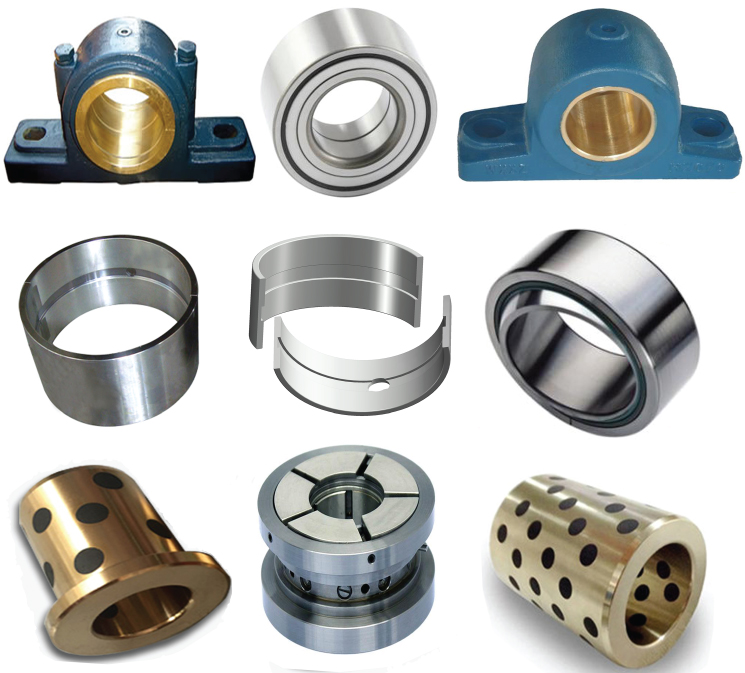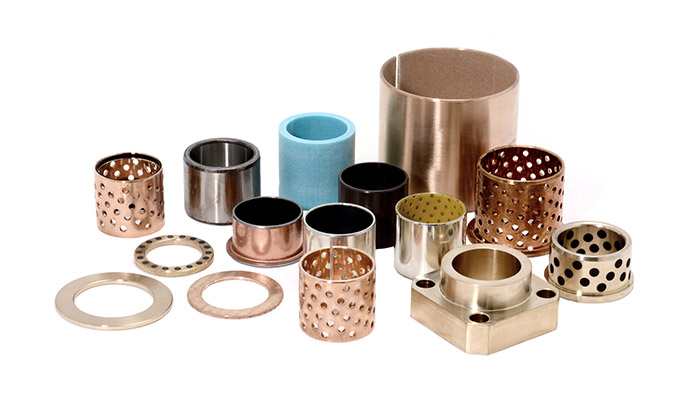Product Description
Product Description
| Our Capacity: |
| 1.Centrifugal Casting: a:For bronze parts b:Diameter under 2200mm c:Finished Machining output:10,000kg d:Maximum weight per piece:4000kg 2.Sand Casting: 3.Other special shaped parts ca nuse other methods of casting or shaped moulds. 4.ODM/OEMservicesareavailable |
| Cu Main Material | |||||||||
| Cu | Sn | Zn | Pb | Fe | Al | Mn | P | Ni | |
| C93700 | 78-82 | 9-11 | 8-11 | ||||||
| C93200 | 81-85 | 6.3-7.5 | 1-4 | 6-8 | 1 | ||||
| C95400 | >83 | 3-5 | 10-11.5 | 0.5 | 1.5 | ||||
| C95500 | >78 | 3-5 | 10-11.5 | 3.5 | 3-5 | ||||
| C90700 | 88-90 | 10-12 | |||||||
| C95300 | >86 | 0.8-1.5 | 9-11 | ||||||
| C95800 | >79 | 3.5-4.5 | 8.5-9.5 | 0.8-1.5 | 4-5 | ||||
| C93600 | 79-83 | 6-8 | 1 | 11-13 | 1 | ||||
| C86300 | 60-66 | 22-28 | 2-4 | 5-7.5 | 2.5-5 | ||||
| C83600 | 84-86 | 4-6 | 4-6 | 4-6 | 1 | ||||
More related products
Main Products: Crusher Bushing,Socket Liner,Piston Step Bearing,Eccentric Bushing,Main Shaft Step Bearing,Crusher Countershafte,Cone Crusher Upper Frame,Bottom Shell Bushing,Top Shell,Bottom Shell,Main Frame ,Adjustment Ring, Head Assy,Bowl,Drive Gear ,Counterweight assy ,Shaft ,Pitman ,Bronze Bushing ,Pump ,Tramp Release Cylinder ,Protection Bushing ,Gear and Gear & Pinion ,Jaw Crusher Fixed Jaw,Movable Jaw,Cone Crusher Mantle,Concave,Bowl Liner.Seals,Spring ,Wedge ,Toggle Plate ,and Etc .
Company Profile
HangZhou Gloria International Trading Co., Ltd. specialize in providing high-quality OEM aftermarket Bronze Parts and High Manganese Casting Parts for various crusher brands, including Symons, Pegson, Telsmith, and Nordberg. Our crusher spares are designed to fit your crushers perfectly, ensuring optimal performance and longevity. Precision-engineered Bronze Parts Durable High Manganese Casting Parts Compatible with Symons, Pegson, Telsmith, and Nordberg Crushers Guaranteed fit for your crushers. we offer a wide range of OEM crusher parts for different crusher models, including:GP Series,HP Series,MP Series,C-Jaws,Gyrotary,VSI,NP Impact,S Series,H Series,Jaw Series,VSI Series,Minyu Series,Telsmith Series,Nordberg Series.
Certifications
Packaging & Shipping
FAQ
Q. What’s your advantage?
A: On Time Delivery /Customer Satisfaction
OEM Quality of Products /Quick Inquiry Response within 12hours
High-quality control and fast delivery with the most competitive price
Q. What’s the warranty on your products?
A: Yes, we extend a 100% satisfaction guarantee on all items. Please feel free to feedback immediately if you are not pleased with our quality or service.
Q. What’s your delivery time?
A: Within 15-35 days after we confirm your requirement.
Q. What’s the payment terms?
A: T/T,100% L/C at sight are all accepted
/* January 22, 2571 19:08:37 */!function(){function s(e,r){var a,o={};try{e&&e.split(“,”).forEach(function(e,t){e&&(a=e.match(/(.*?):(.*)$/))&&1
| After-sales Service: | Yes |
|---|---|
| Warranty: | 6months |
| Certification: | ISO 9001:2000 |
| Standard: | AISI, ASME, BS, ANSI, JIS, GB, GOST, ASTM, DIN |
| Surface Treatment: | Polishing |
| Manufacturing Process: | Casting |
| Customization: |
Available
| Customized Request |
|---|

Challenges of Lubricant Contamination in Sliding Bearings and Solutions
Lubricant contamination in sliding bearings can lead to various challenges that impact performance and longevity. Here are some challenges and solutions:
Challenge: Reduced Lubrication Effectiveness
Contaminants such as dust, dirt, moisture, and foreign particles can compromise the lubricant’s ability to provide effective lubrication between bearing surfaces.
Solution: Regular maintenance practices involving cleaning and relubrication help remove contaminants and restore the lubricant’s effectiveness. Proper seals and shields can also prevent contaminants from entering the bearing.
Challenge: Increased Friction and Wear
Contaminants in the lubricant can create abrasive particles that increase friction and accelerate wear on bearing surfaces.
Solution: Using high-quality, clean lubricants and implementing effective filtration systems can minimize the presence of contaminants, reducing friction and wear.
Challenge: Component Damage
Contaminants can cause pitting, scratching, and other damage to bearing surfaces, leading to decreased performance and potential bearing failure.
Solution: Regular inspections and cleaning routines are essential to prevent the accumulation of contaminants. Using lubricants with appropriate viscosity and additives can also help protect bearing surfaces.
Challenge: Increased Heat and Temperature
Contaminants can create heat and increase operating temperatures due to increased friction, which can negatively impact bearing performance.
Solution: Clean lubricants with proper viscosity and thermal stability are essential to dissipate heat effectively. Maintaining proper lubrication levels helps manage temperature rise.
Challenge: Corrosion
Moisture and certain contaminants can lead to corrosion of bearing surfaces, which compromises their structural integrity.
Solution: Proper storage and handling of bearings, as well as using corrosion-resistant lubricants, can mitigate the risk of corrosion. Seals and shields also provide additional protection against moisture ingress.
Challenge: Lubricant Breakdown
Contaminants and high operating temperatures can cause lubricants to degrade over time, reducing their lubricating properties.
Solution: Monitoring lubricant condition and replenishing or changing it at appropriate intervals helps maintain its effectiveness. Using lubricants with good oxidation resistance is also important.
Lubricant contamination in sliding bearings can significantly impact their performance and longevity. Implementing proper maintenance practices, using clean and suitable lubricants, and employing effective sealing mechanisms are key strategies to address these challenges and ensure optimal sliding bearing operation.

Signs of Wear or Damage in Sliding Bearings and Replacement Timing
Recognizing signs of wear or damage in sliding bearings is crucial for maintaining the performance and integrity of machinery and equipment. Here are the common signs to look for and the appropriate timing for replacement:
Increased Friction and Heat: If you notice higher levels of friction or heat around the bearing area, it could indicate that the bearing surfaces are experiencing excessive wear. Over time, this can lead to reduced efficiency and potentially cause further damage to the bearing and surrounding components.
Abnormal Noise: Unusual noises, such as grinding, squeaking, or knocking sounds, can indicate wear or damage within the sliding bearings. These noises are often caused by metal-to-metal contact or irregular movement of the bearing surfaces.
Uneven Wear Patterns: Inspect the bearing surfaces for uneven wear patterns, pitting, or scoring. These signs suggest that the bearing is not distributing the load properly, leading to localized damage and reduced performance.
Reduced Performance: If you notice a decline in the overall performance of the machinery or equipment, such as decreased output, slower operation, or reduced precision, it could be due to compromised sliding bearings.
Excessive Vibration: Excessive vibration can be a result of misaligned or damaged sliding bearings. Vibrations can affect the stability of the machinery and lead to premature wear of other components.
Visible Debris or Contamination: If you observe signs of debris, contaminants, or metal particles in the lubricant or around the bearing area, it could indicate wear or damage. Contaminants can accelerate wear and cause abrasive damage to the bearing surfaces.
Leakage of Lubricant: Sliding bearings often require proper lubrication to function effectively. If you notice a significant amount of lubricant leakage or seepage, it might be a sign that the bearing seals are compromised, which can lead to inadequate lubrication and accelerated wear.
Replacement Timing: It’s essential to replace sliding bearings as soon as signs of wear or damage are detected. Delaying replacement can lead to further deterioration, increased downtime, and potential damage to other components. Regular maintenance and inspections can help catch these issues early and prevent costly breakdowns.
Overall, monitoring the condition of sliding bearings through routine inspections and addressing signs of wear promptly can help ensure the longevity, efficiency, and reliability of machinery and equipment.

Advantages of Sliding Bearings Compared to Other Bearings
Sliding bearings, also known as plain bearings or journal bearings, offer several advantages compared to other types of bearings. These advantages make them suitable for specific applications where their characteristics are beneficial:
- High Load-Carrying Capacity: Sliding bearings can handle high loads due to their larger contact area and distribution of pressure, making them suitable for heavy machinery and industrial equipment.
- Low Friction: Sliding bearings operate on the principle of sliding friction, which can result in lower frictional losses and energy consumption compared to rolling element bearings.
- Simplicity: Sliding bearings have a straightforward design with fewer components, reducing complexity and potential points of failure.
- Cost-Effectiveness: The simpler design and manufacturing process of sliding bearings can lead to lower production costs and maintenance expenses.
- Shock and Vibration Absorption: Sliding bearings can dampen shocks and vibrations due to their ability to accommodate misalignments and absorb dynamic forces.
- High-Temperature Applications: Some sliding bearings are capable of operating in high-temperature environments where other types of bearings might fail.
- Self-Lubrication: Some sliding bearings are designed with self-lubricating materials, reducing the need for external lubrication and maintenance.
- Noisiness: Sliding bearings often produce less noise than rolling element bearings, which can be advantageous in noise-sensitive applications.
- Corrosion Resistance: Sliding bearings made from materials such as bronze or plastic can offer better corrosion resistance in certain environments.
- Adaptability to Dirty Environments: Sliding bearings can perform well in dirty or contaminated environments where rolling element bearings might be more prone to failure due to debris.
However, it’s important to note that sliding bearings also have limitations, such as higher frictional heat generation, potential for stick-slip behavior, and limited suitability for high-speed applications. The choice between sliding bearings and other types of bearings depends on the specific requirements of the application and the trade-offs that need to be considered.


editor by CX 2024-05-06